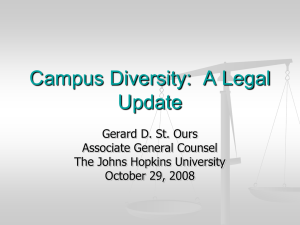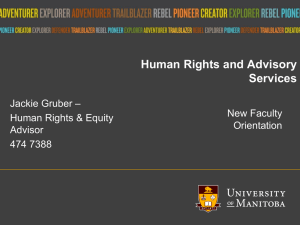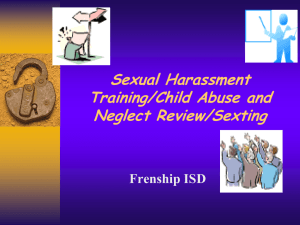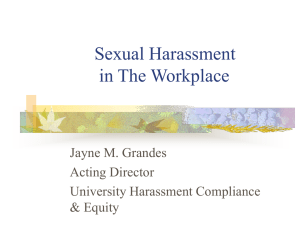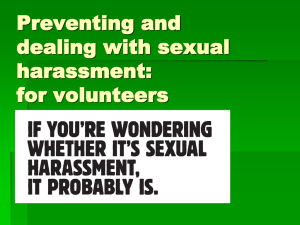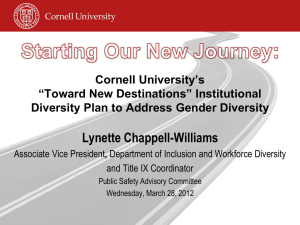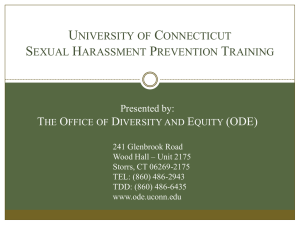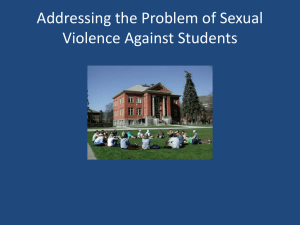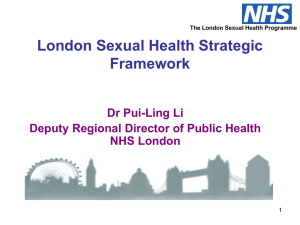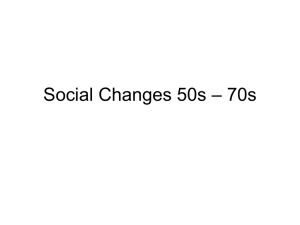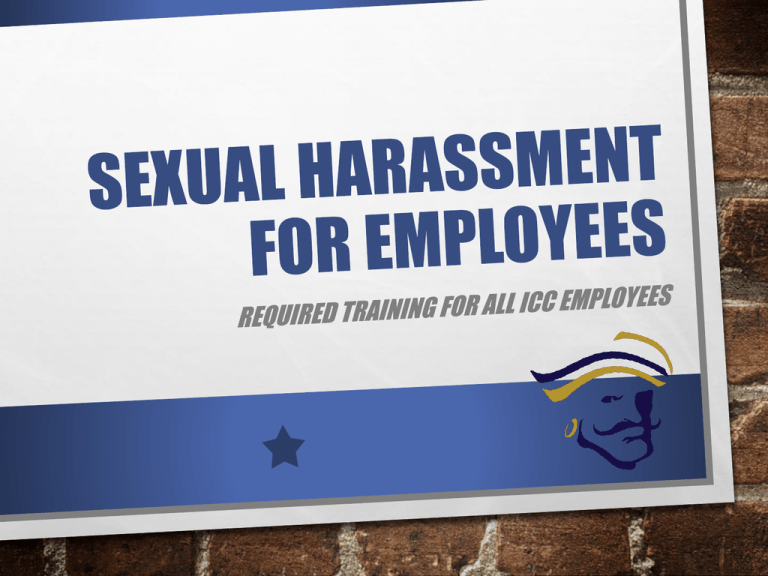
Title VII of the
Civil Rights Act of 1964
WHY ARE YOU REQUIRED TO COMPLETE
THIS TRAINING?
Equal Employment
Opportunity
Commission (EEOC)
Learning Outcomes for this Training
Define sexual harassment,
Identify potential victims and harassers,
Identify conduct and behavior that is not appropriate
in the workplace,
Report incidents of possible sexual harassment,
and
Increase the chances of having a positive work
environment.
Defining Sexual Harassment
Any unwelcome sexual advances
Requests for sexual favors
Verbal or physical conduct of a sexual nature when:
Submission to or rejection of such conduct by an individual is used as
the basis for employment decisions affecting such individual
Submission to this conduct is made either explicitly or implicitly a term
or condition of an individual’s employment
Such conduct creates an intimidating, hostile or offensive work
environment.
“something for something”
Quid pro
quo
Press Release
1-28-13
EEOC Reports Nearly
100,000 Job Bias
Charges in Fiscal
Year 2012
http://www.eeoc.gov/eeoc/newsroom/release/1-28-13.cfm
Hostile Work Environment
Potential Victims and Harassers
Victims
Harassers
More than one
May be male or female
May be male or female
May be male to female, female to
male, male to male or female to
female
May be a member of the workplace or
an outside source such as a vendor,
contractor, or sales representative.
What is “Inappropriate” Conduct and Behavior?
• Staring or leering
• Offensive remarks about a co-worker’s looks, clothing
and/or body
• Physical contact in a manner that creates an
uncomfortable feeling
• Sexual or offensive jokes or making sexual gestures
• Displaying sexually related material
• Sexually related material in email, letters, or notes
What is “Inappropriate” Conduct and Behavior?
Preventing Sexual Harassment at Work
Be proactive.
Speak up!
Report inappropriate
behavior.
Keli Tuschman
ICC Concern Log
Director of Human Resources
Extension 5606
http://www.indycc.edu/contact-us/
Independence Community College’s
Policy on Harassment
Harassment of anyone, or by anyone, associated with Independence Community College is
prohibited. This includes members of the Board of Trustees, staff, faculty, students, and College
vendors while on campus or in any way associated with the College off campus. Harassment is
generally defined as consistent, persistent or unwelcome behaviors, comments (written or
spoken) or physical contact that in any way promotes an environment of violence, hostility,
degradation, exploitation, intimidation, or fear. The types of harassment prohibited include, but
are not limited to: bullying, sexual harassment (including gender identity and sexual
orientation), racial harassment, age based harassment, country of origin harassment, belief
based harassment, Veteran status based harassment, hazing, stalking, mobbing, and abuse.
Staff and Faculty Handbook
The Effects of Sexual Harassment
What Should You Do If Sexual Harassment Occurs?
Condensed from the ICC Staff and Faculty Handbook:
Report the incident to their immediate supervisor. The initiation of a report shall not affect the
employee’s status, compensation, or work assignment. All reports of harassment shall be
maintained in strict confidentiality.
Immediate supervisors must report any harassment incident to Human Resources. If the
harassment received by the employee is believed to be from the immediate supervisor, the initial
report will go to Human Resources and the President.
Human Resources will initiate a confidential finding of fact upon receipt of a harassment report.
If Human Resources determines action in response to harassment based on fact finding, the
recommendation should be sent to the appropriate supervisor or the President if the supervisor is
involved.
Opportunity for appeal is provided in the Employee Grievance Procedures.
Reporting a Harassment Claim to Your Supervisor
or ICC’s HR Department
When? Date and time of the incident
Where? Location where the incident took place
Who? Person(s) involved including any witnesses
What? Detailed description of what happened
Any other pertinent information that will help in the
investigation
Sexual Harassment Case Scenarios for
Employees
Case 1
Tom and Sherri
Sexual Harassment Case Scenarios for
Employees
Case 2
Mike
Sexual Harassment Case Scenarios for
Employees
Case 3
Sandy
Sexual Harassment Case Scenarios for
Employees
Case 4
John and Louise
Sexual Harassment Case Scenarios for
Employees
Case 5
Tony
Sexual Harassment Case Scenarios for
Employees
Case 6
Susan and Lisa
Sexual Harassment Case Scenarios for
Employees
Case 7
Bryan
Sexual Harassment Case Scenarios for
Employees
Case 8
Shirley, Stacy,
and Mary
You Can Make a Difference!
Be aware of your actions
Be cautious
Be proactive
Be responsible
Everyone benefits in a workplace free
from sexual harassment.
For more information about ICC’s workplace policies, see the Staff and Faculty Handbook. For more
information about any type of harassment, contact ICC’s Human Resources Department at Ext. 5606.
Please proceed to the
Sexual Harassment Training Quiz
ICC’s required Sexual Harassment Training is not complete until
the quiz is completed.

